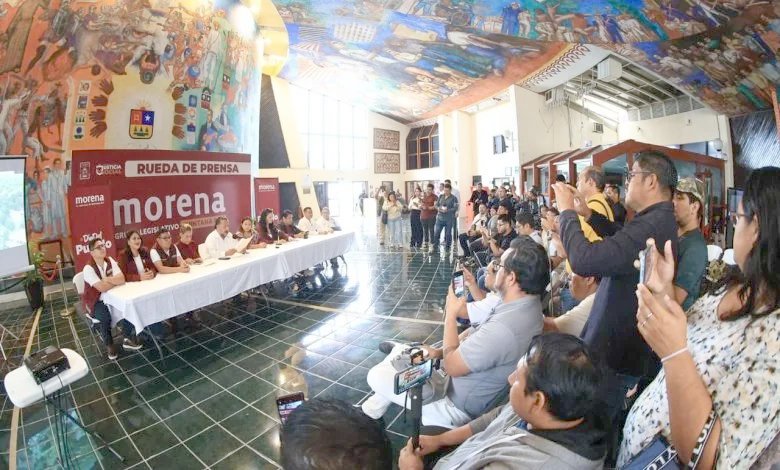Chetumal — The foundation of the so-called "People's Day" by the National Regeneration Movement (Morena) party does not originate from a national law or a decree from the Federal Government, but is instead an action promoted by the party within its own structures, particularly at the municipal level. It is a party initiative to bring its governments closer to the citizenry.
For instance, in July 2025, it was reported that Morena instated the measure at the municipal level, demanding that mayors hold public audiences once a week. The stated purpose of Morena's People's Day is to oblige mayors and party officials to hold weekly public audiences to listen to and directly address the demands and needs of citizens.
On July 31, 2025, Luisa María Alcalde, the national leader of Morena, promoted the creation of the "People's Day" so that municipal presidents would hold weekly public audiences. The intention was to strengthen the link between local governments and inhabitants, avoiding institutional distance and simulation.
On September 30, 2025, the XVIII Legislature of the Quintana Roo Congress approved the entry of the initiative to establish the "People's Day," which was then referred to the Commission for Constitutional Points. The initiative highlights the obligation for mayors to hold public audiences once a week.
Deputy Jorge Sanén Cervantes of Morena, true to his habit of recycling initiatives, was the main driver of this measure, presented as a historic, distinctive hallmark. Despite its approval, several municipalities have ignored or failed to fulfill the obligation, replicating a pattern of simulation that had already been observed since the Citizen Participation Law of 2017, when public audiences remained on paper but not in practice.
Legally, city councils are obligated to hold these audiences, but the norm lacks clear sanction mechanisms. Politically, the lack of compliance reflects the tension between Morena's narrative of "closeness with the people" and the practice of municipal governments that maintain distance. For the citizenry, without these audiences, a key space for direct management is lost, which perpetuates exclusion and a lack of transparency.
This mechanism seeks to have all Morena mayors hold weekly public audiences to listen directly to citizens. This initiative establishes that the authorities of the municipal councils will hold public audiences. Specifically, these audiences will be considered as "The People's Day." This will allow everyone to present their needs, problems, opinions, and suggestions at the center of public life.
Consequently, municipal authorities must address the concerns of the society in their respective municipalities with professionalism, ethics, and promptness. In this way, they guarantee direct attention between civil society and the government. Furthermore, it reinforces mutual understanding and highlights areas of opportunity for the benefit of all people.
The central objective of this legislative action is very clear. It seeks to have governments and public institutions place social justice as their most important objective. This approach will be achieved through real closeness to the population.
However, without economic resources, the public audiences—or the so-called "People's Day"—do not function in practice. The reason they do not work is that people from rural or remote communities cannot afford transportation to attend. There is no budget to enable dignified spaces, provide logistics, interpreters, or support materials. Without resources, the audiences are reduced to symbolic acts, where people are heard but nothing is resolved. Attendees end up returning home empty-handed, reinforcing the perception that it is a mechanism for propaganda rather than participation.
Suddenly, they decided to shout from the rooftops, inside or outside the Legislative Palace, that they propose to approve the so-called "People's Day," meaning to designate a specific day of the week for each mayor and their team to offer attention to the people in a public audience, resolving problems and situations or at least listening to the people.
In practice, this seems to have some reason, since effectively the 11 municipal presidents and their friends spend almost all their time enjoying the money, the power, and even the pleasure of the women or men (there are many gay people) they have at their service, while problems of all kinds multiply.
But the "guindas" (a term for Morena members) have always said they are different from previous politicians, that they do not lie, do not steal, and do not betray. But, until now, is this how they realize they have failed to uphold these maxims, starting precisely with the deputies? During the first year of his term, when he was the head of the Legislative Branch, the same Jorge Sanén Cervantes failed in everything with his arrogance, lack of values, and lack of political talent by repudiating the people who came just to meet or interview him.
Creating a so-called law that establishes the "People's Day"—while the deputies continue to live the high life because they have not even bothered to restrain the other branches of government, the Executive and Judicial, whose 34 officials had their public accounts reproved in the handling of the people's money?
The Morena deputies want the people to have a day by law, but the mayors have turned it into an empty day.
Discover more from Riviera Maya News & Events
Subscribe to get the latest posts sent to your email.
